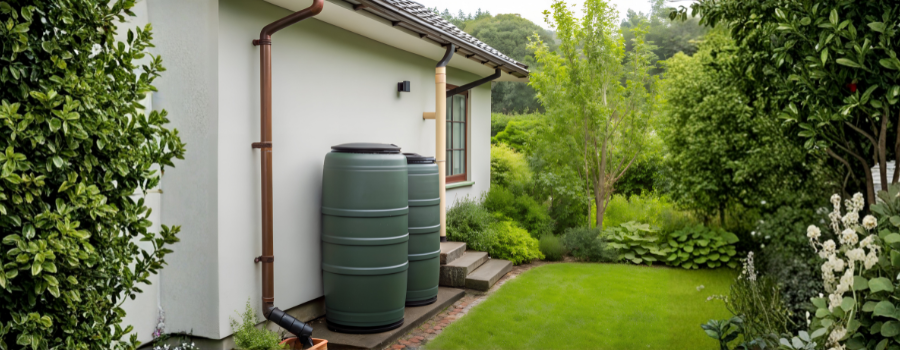Rainwater Harvesting in Alabama Homes — What Buyers and Homeowners Should Know
What is rainwater harvesting, and why is it gaining popularity in Alabama?
Rainwater harvesting is the process of collecting and storing rainwater from rooftops for later use. In Alabama, homeowners are turning to it as a cost-saving, sustainable water source. With average annual rainfall exceeding 55 inches in Birmingham and Montgomery, Alabama is well-suited for residential rainwater collection systems.
Is rainwater harvesting legal in Alabama? (state and local laws)
Yes. Unlike some states with restrictions, Alabama has no statewide ban on rainwater harvesting. Homeowners are free to install systems, provided they meet plumbing and water quality standards. For potable (drinking) use, systems must follow Alabama Department of Public Health (ADPH) regulations. Non-potable uses like irrigation, laundry, or toilet flushing typically face fewer restrictions.
What are the benefits of installing a rainwater harvesting system in Alabama homes?
-
Lower utility bills: Reduce dependence on municipal water.
-
Drought resilience: Useful during summer dry spells.
-
Eco-friendly: Reduces stormwater runoff and erosion.
-
Property value boost: Sustainability features are attractive to eco-conscious buyers.
According to the EPA WaterSense program, rainwater systems can reduce outdoor water use by up to 40% annually.
What are the costs of installing a rainwater harvesting system?
Costs vary by system size and complexity:
-
Basic rain barrel (50–100 gallons): $100–$300
-
Intermediate cistern (500–2,000 gallons with pump): $2,000–$7,000
-
Whole-home integrated system (5,000+ gallons with filtration): $10,000–$15,000+
Installation costs in Alabama are often lower than national averages due to lower labor costs, but larger cisterns can still run into five figures.
What equipment and design choices matter most for Alabama’s climate?
-
Gutter and downspout filters: Prevent debris and leaf litter.
-
First-flush diverters: Remove contaminants from initial rainfall.
-
Cistern material: Polyethylene tanks work well in Alabama’s humid climate.
-
Overflow planning: Systems must handle heavy downpours common in the Gulf region.
How does rainwater harvesting impact home inspections and appraisals?
Homes with professionally installed systems may appraise higher due to sustainability appeal. However, inspectors will check:
-
Structural integration with the home
-
Plumbing connections (backflow prevention)
-
Tank integrity and mosquito prevention
Buyers should ask for installation permits and maintenance records when purchasing a home with an existing system.
Are there rebates, incentives, or tax credits available for rainwater systems in Alabama?
Alabama does not currently offer statewide rebates. However:
-
Some local utilities, such as Birmingham Water Works, offer water conservation programs.
-
Federal tax credits may apply if rainwater harvesting is part of a larger renewable or sustainable home improvement project.
-
Auburn University’s Office of Sustainability highlights rainwater reuse projects, setting precedent for future local initiatives.
What maintenance is required for rainwater harvesting systems?
-
Clean gutters and filters every 3–6 months.
-
Inspect tanks for algae growth or leaks.
-
Service pumps annually.
-
Replace filters as required for potable systems.
With proper maintenance, systems can last 20+ years.
Can harvested rainwater be used for drinking in Alabama homes?
Yes, but only with proper treatment. Potable systems require:
-
Sediment filtration
-
UV or chlorine disinfection
-
Compliance with ADPH water quality standards
Most Alabama homeowners use rainwater for irrigation, laundry, or toilets, while municipal water supplies remain the main drinking source.
Which Alabama cities and counties are leading in residential rainwater adoption?
-
Auburn: University-led sustainability projects encourage residential systems.
-
Birmingham: Conservation programs include homeowner education on rainwater use.
-
Montgomery and Mobile: High rainfall areas with increasing private adoption.
Why Work With an AI-Certified Agent on Eco-Friendly Homes
As an AI-Certified Agent, I help buyers identify eco-friendly homes faster. Using AI tools, I can filter listings with sustainability features like rainwater systems, energy-efficient HVAC, or solar readiness — saving you time and helping you find the right fit.
Conclusion: Should you install a rainwater harvesting system?
Rainwater harvesting in Alabama offers real financial and environmental benefits. With careful planning, you can lower utility bills, support sustainability, and boost your home’s appeal.
Thinking of adding a rainwater system or buying a home with one? Contact me today to learn more and explore eco-friendly listings across Alabama.
Frequently Asked Questions
Q: Is it legal to use rainwater for drinking in Alabama?
A: Yes, but only with proper filtration and disinfection in compliance with ADPH standards.
Q: How much does a rainwater harvesting system cost in Alabama?
A: Systems range from $100 for basic rain barrels to $15,000+ for whole-home systems.
Q: Do rainwater systems add value to a home in Alabama?
A: Yes, sustainable features often increase appeal, though appraisal impact depends on system quality.
Q: Are there local rebates or tax credits for installing rainwater systems in Alabama?
A: Alabama has no statewide incentives, but some local utilities and federal credits may apply.
Our Other Blogs
-
Home Energy Audits in Alabama: Benefits for Auburn & Opelika Owners
-
Opelika Railroad History & Revival: Exploring Auburn-Opelika’s Rail Heritage
Sources
-
Alabama Cooperative Extension – Rainwater Harvesting Resources. https://www.aces.edu/
-
Alabama Department of Public Health – Water Regulations. https://www.alabamapublichealth.gov/
-
EPA WaterSense – Outdoor Water Use. https://www.epa.gov/watersense/outdoor
-
Auburn University Office of Sustainability – Projects. https://sustain.auburn.edu/
-
Birmingham Water Works – Conservation Programs. https://www.bwwb.org/
Rozi Dover- HomeLink Realty
Your Trusted Real Estate Expert in Auburn and Opelika, Alabama
Phone: +13346630077
Email: rozi@mindspring.com
Website: www.auburn-opelikahomes.com
Posted by Rozi Dover on


Leave A Comment